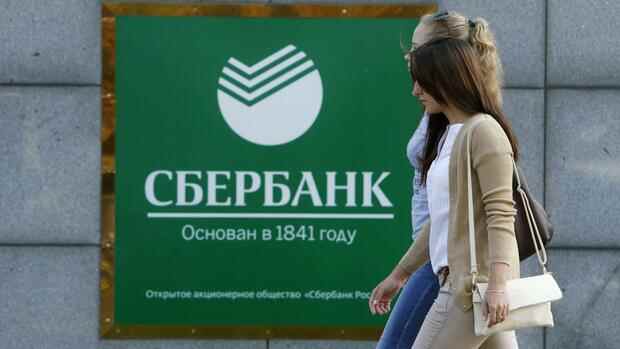The EU subsidiary of the state-run bank is insolvent.
(Photo: Reuters)
Vienna The EU’s tougher financial sanctions against Russia are claiming a first victim. According to the European Central Bank, Sberbank Europe AG, a wholly owned subsidiary of Sberbank Russia, and its Croatian and Slovenian branches are or are about to be insolvent.
The subsidiary of Russia’s largest bank apparently went bankrupt: “Due to the effects of geopolitical tensions on their reputation, Sberbank Europe AG and its subsidiaries had to accept significant outflows of deposits,” explains the ECB. “This caused their cash position to deteriorate.”
There is no way that would offer a realistic chance of restoring liquidity. Russia is the majority owner of the bank.
Also, Sberbank itself acknowledged that customers withdraw their funds. In some subsidiary banks, this has led to longer waiting times in the branches and in some cases to a restriction on the amount of daily cash withdrawals.
Top jobs of the day
Find the best jobs now and
be notified by email.
The bank said in a statement Monday it wanted to protect its customers and maintain the bank’s critical functions. “We are making every effort and fully supporting the authorities to use their powers to manage this unprecedented situation in the interests of customers,” says Sonja Sarközi, CEO of Sberbank Europe.
Deposits secured up to EUR 100,000
Sberbank Direct, a branch of Sberbank Europe, also collected money from private investors in Germany and recently lured customers with interest payments of up to 1.5 percent. Since the European subsidiary has its headquarters in Vienna, it is covered by the Austrian deposit insurance. In the European Union, all deposits up to EUR 100,000 per customer and bank are protected.
The German financial regulator Bafin confirmed that deposits by German depositors at Sberbank Direct are protected by the Austrian deposit insurance. “In the event of compensation, the Austrian compensation institution must immediately examine the compensation claims of the depositors and take the appropriate compensation measures,” the authority said.
According to its own statements, Sberbank Europe operates in eight countries in Central and Eastern Europe and has total assets of 13 billion euros. The institute looks after 800,000 customers, operates 187 branches and has more than 3,900 employees.
More on the Ukraine crisis:
In addition to Sberbank, the Russian VTB is also active in Europe and collects deposits from private customers in Germany with its subsidiary VTB Direktbank. The situation there is apparently not as dramatic as at Sberbank’s European subsidiaries.
“Due to the current situation, Bafin is in close contact with the bank,” said a spokesman for the German financial regulator. “Existing customers who are not subject to the sanctions can currently dispose of their credit within the framework of the contractual agreements.”
VTB initially did not respond to a request on the subject. On the website, the institute also explains that money at VTB Direktbank is as safe “as at any other bank based in Germany”. In addition, deposits are secured up to at least EUR 750,000 per customer through membership in the deposit protection fund of German banks.
Because of the situation in Ukraine, Bafin has already intensified supervision of VTB Bank according to Handelsblatt information. One of the most important concerns of the financial regulator is to prevent funds from being transferred from VTB Bank in Europe to Russia.
With agency material
More: Panic on bonds, ruble plummeting: Russian central bank doubles key interest rate to 20 percent
